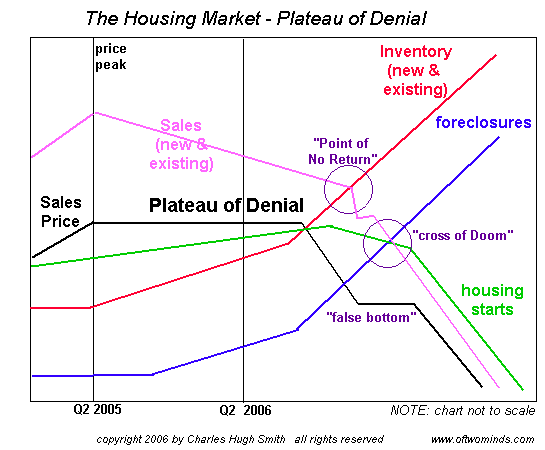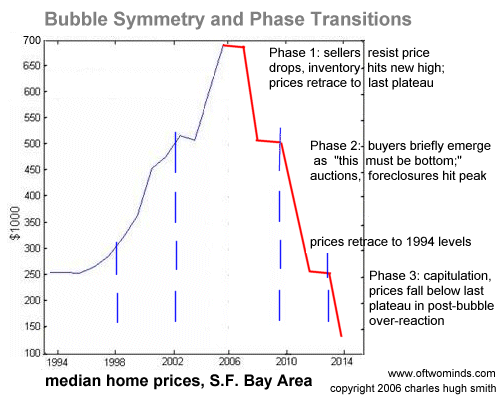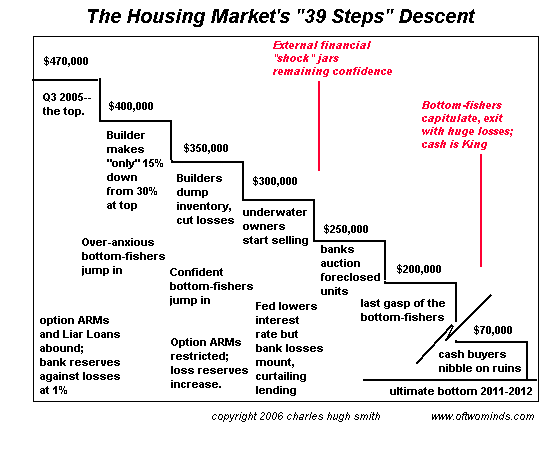Advice and Predictions
Every once in a while you see a photo which deserves to be in either National Geographic or a museum photography exhibit. Correspondent John U. was kind enough to send this photo he took at the Burning Man event in Nevada:
I asked John for a caption suggestion, and he came up with the perfect one: Somewhere under the Rainbow.
As John put it, "it's a right-click world," meaning anyone can grab this for their own use. As my colleague Jeff Blair noted, the Web is a giant copy machine.
Isn't this a great photo? Thank you, John, for enabling others to enjoy it. It inspires me to offer up some advice, but unfortunately I don't have any. I do have some predictions, though, which are easier.
1. U.S. Unemployment will hit 15% within the next four years. The general consensus at the moment is unemployment might inch up from 5% to 6% before everything returns to "growth" wonderfulness.
The whole "unemployment" number is suspect, of course, for it only measures people who have laid off/quit and who are "actively seeking employment" at their local unemployment office. "Discouraged workers" or those out of work longer than six months aren't even counted.
Most people on the unemployment rolls are "between jobs," and so a stable unemployment rate suggests the unemployed are finding other jobs.
Other twists include: self-employed people whose income drops to near-zero are not counted, and a laid-off full-time worker who accepts a part-time job at much lower pay is counted as employed. The non-legal workers in the U.S. aren't counted either, of course. though it is estimated there are 6 to 10 million or even more undocumented workers.
The number of employed in the U.S. is about 138 million. Add in about 7 million officially unemployed and at least 5 million cash/illegal workers, and you get a total workforce of about 150 million. A 6% unemployment rate suggests about 8 million "officially counted" workers would be out of work in the "short, shallow recession" the punditry is predicting.
It's easy to see how the true unemployment rate can be fudged/massaged in a deep recession. All those out of work longer than six months--not counted. Self-employed (Realtors, mortgage brokers, etc.) no longer working or making an income, not counted. "Discouraged workers" (i.e. anyone who stops reporting to the unemployment office) aren't counted, either.
So in predicting 15% unemployment, I am saying 22 million people who would like to be working won't be able to find a real job. But the "official" rate of unemployment at this dire moment may well be 9% or so, as millions of unemployed won't even be counted.
This may sound like a return to the Great Depression. For me, it's simply a return to 1982. Are you 26 years old? Well, the year you were born, 1982, was a nadir for the U.S. economy and its workers. Unofficial unemployment was estimated to be 15%, while the "official rate" hit 10.8%.
While there are significant differences between the early 80s and the present, several conditions are quite similar:
1. Few could borrow money, choking off business expansion and auto and real estate sales.
2. A real estate bubble (modest by current standards) was popping.
3. Energy costs had risen enough to inflict damage on the economy.
4. Global competition was forcing laggard U.S. firms into bankruptcy.
5. Purchasing power was dropping like the proverbial stone.
6. Financial institutions were failing.
7. Cities were edging toward bankruptcy.
So why am I predicting such a high unemployment rate? Basically, the bigger the bubble, the longer and deeper the unraveling/unwinding. Take the biggest real estate bubble in global history and the biggest lending/financial bubble in history, toss in declining purchasing power, a public sector veering toward a cliff of insolvency, a banking sector heading for the same cliff, and a bunch of other negatives covered here and elsewhere in the blogosphere, and it's easy to predict this will not be a "short, shallow recession."
I live in a college town of 120,000 residents (about 35,000 are students). Here are some fine retailers who seem like naturals for this college environment: Ross Dress for Less, Barnes and Noble bookstore, an independent bookstore or two, Eddie Bauer (for the upscale students), and Gap.
Yes, they were all here, but they've all closed. Yes, every one of these "natural" retailers folded shop and left town. So did the local Burger King. If the recession hasn't even started, and a college town has already been gutted by businesses leaving, what do you reckon will happen when the recession deepens? How many other chain stores will be closed as "insufficiently profitable" by corporate HQ desperate to maintain a profit?
And how about when those 10% across-the-board cuts our Governor has proposed to ease the state's "fiscal crisis" (which is basically permanent except during bubbles) hit the University and other agencies? Unfortunately, these government entities' primary expense is employees. There won't be any way to trim the budget without lay-offs. Those 10% cuts will be very painful to those losing their jobs/contracts.
Sadly, it's all too easy to predict a tripling of unemployment. Fewer paychecks leads to reduced spending which leads to reduced taxes which leads to reduced headcount which leads to fewer paychecks, and so on.
Now we get a double-whammy: a consumer recession and a business-investment recession. We all know about the consumer's back against the wall; it's the BusinessWeek cover story Over the Limit. But what about business investment?
Internet: built out.
Software: built out.
Office space: overbuilt.
Retail space: overbuilt.
The same issue has a story entitled, Capital spending hangs in, but for how much longer? Even more interesting is the story: $1.6 Trillion. Now We're Talking Stimulus: That's how much is just sitting on U.S. company books. And for what? Corporations with fat cash reserves aren't doing much for investors—or the economy.
Allow me to explain to the mystified writer of the piece: corporations are holding onto their cash because they don't see any investment opportunities worthy of risking the capital. These folks aren't morons; who would be dumb enough to sink money into anything just as recession is about to grab the throats of consumers, businesses and government? Even Big Oil is worried high oil prices won't last--and they have a point.
2. Housing will continue down the path I laid out in 2006. I still think these little charts are a good roadmap to the future:
I think we may finally be exiting "The Plateau of Denial" though this is unconfirmed. Continued sharp price declines would be confirmation.
And if that isn't negative enough, then here's one last one to ponder as "impossible":
Back in the good old days of deflating real estate bubbles (say, 1981), many owners had enough equity in their homes that they could "seller finance," i.e. offer the buyer a private mortgage, usually for five years or so, with the idea being the buyer would get a bank mortgage and pay off the private loan once lending to return to normal.
While about 20% of all homeowners own their houses free and clear, and these folks could offer seller financing, the general trend for the remaining 80% is declining equity. If you have to sell, but few can borrow, then what happens to price? If you expect, like many of us do, that the entire global financial markets will remain frozen/in shock/implode, then you don't really know how low prices will go because you won't know when the mortgage market will return to "normal."
If you believe all the financial issues (liquidity crisis, freeze-up of CDO market, etc.) are about to get resolved, then you will find my predictions as absurd today as they were in 2006.
All I can say is: real estate and housing are totally dependent on a freely accessible flow of capital for lending/borrowing. If for any reason people can't borrow $500,000, or decline to borrow $500,000, then houses listed for $500,000 will not sell. Their price will decline to what people will willingly borrow.
The question then becomes: what if few can borrow, or are willing to borrow huge sums? Then the price will have to drop to the point the house makes sense as a business proposition, i.e. market rents enable a better return on capital (investment) to a cash buyer of the house than any other potential investment.
I submit that investment matrix supports my prediction that housing has a long way yet to fall in most global markets. Remove appreciation, add in periods of vacancies, operating expenses, taxes, maintenance and all the other expenses of a rental property and you get a much different investment valuation for housing than you would with a "market appraisal."
Wait a minute, I do have something which might pass for advice, taken from Lao Tzu: The way of the Tao is reversal.
NOTE: contributions are humbly acknowledged in the order received. Your name and email remain confidential and will not be given to any other individual, company or agency.
Thank you, Alexander P. ($20), for your generous support of this humble site from N.Z. I am greatly honored by your contribution and readership. All contributors are listed below in acknowledgement of my gratitude.
























